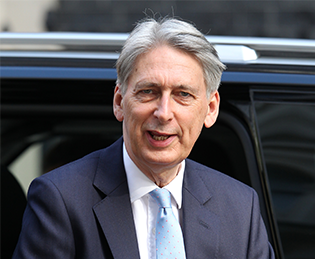Autumn Budget 2018 - what it means for healthcare
Chancellor Phillip Hammond has announced the government’s Autumn Budget. He promised: “A budget for hard working families who live their lives far from this place and care little for the twists and turns of Westminster politics.”
Over the past year, Brexit has affected the workforce as many European staff feel their future is uncertain, and the number of EU nationals registering as nurses in England dropped by 92% following the 2016 referendum (see https://www.theguardian.com).
As NHS leaders called for more funding to end the healthcare crisis, and the Prime Minster recently told the country that “austerity is over”, we decided to take a look at how the budget will affect healthcare in 2019//20.
’NHS is our No.1 priority’
 Mr Hammond announced that public sector net borrowing is set to fall to its lowest in a generation by 2024, which is set to hit the NHS where it hurts in terms of funding.
Mr Hammond announced that public sector net borrowing is set to fall to its lowest in a generation by 2024, which is set to hit the NHS where it hurts in terms of funding.
He said that in June the “single largest cash commitment to our public services ever made by a peacetime Government” in the form of an £84bn five-year deal for the NHS had already been announced. Such boosts in funding have been facilitated by moves including a change in the Personal Allowance and Higher Rate Threshold taxes, and the scrapping of Entrepreneur’s Relief.
My Hammond said this was “half as much again as the increase Labour offered the NHS at the last election”. He added: “Let me be clear: We are delivering this historic £20.5bn real terms increase for the NHS in full over the next five years. So, in a very important sense, we made our big choice for this budget, four months before it was delivered. And this was the right decision: our NHS is the number one priority of the British people; and as we approached the 70th anniversary of its foundation, they had a right to know the scale of our commitment to it.”
But Anita Charlesworth, Health Foundation Director of Research and Economics, tweeted in June after the funding announcement was made: “Most important take home about NHS spending announcement - it’s enough for standstill service quality, it’s NOT enough for a shopping list of improvements. It excludes capital, training, public health and social care - all must get extra funding in the Autumn Budget.”
Mental health funding
Regarding mental health, Mr Hammond said: “There are many pressing demands on additional NHS funding, but few more pressing than the needs of those who suffer from mental illness. And today I can announce that the NHS 10 Year Plan will include a new mental health crisis service, with comprehensive mental health support available in every major A&E, children and young peoples’ crisis teams in every part of the country, more mental health ambulances, more ‘safe havens’ in the community, and a 24-hour mental health crisis hotline.
“These new services will ensure that people suffering from a crisis, young or old, can get the help they need, ending the stigma that has forced too many to suffer in silence and the tragedy of too many lives lost to suicide.
“We are proud to have made this extraordinary commitment to funding our NHS – a precious institution that has been nurtured for most of its life by Conservative Governments.”
Social care funding
As the Chancellor said the Social Care Green Paper was due to be published “shortly”, he vowed to build on the £240m for Social Care winter pressures announced earlier this month, with a further £650m of grant funding for English Authorities for 2019-20 and an additional £45m for the Disabled Facilities Grant in England in 2018-19.
Richard Murray, Director of Policy at The King’s Fund, said: “The social care system cannot continue to get by on last-minute, piecemeal funding announcements. Adult social care in England needs at least £1.5 billion more per year simply to cope with demand meaning that the funding announced today, which will also need to cover children’s social care, falls far short. This highlights the need for a long-term plan for how social care will be funded and structured so that it can meet increasing demand. Successive Governments have dodged tough decisions on social care and the forthcoming Green Paper must now ensure social care gets the long-term plan it so desperately needs.
“Two billion pounds for mental health confirms the early signals that this would be a key priority for the forthcoming NHS long-term plan. But years of underfunding have taken their toll and this is no more than a small step on the road to parity of esteem. Mental health services need more than money to meet demand. A chronic shortage of mental health staff means that, despite the new funding, the service won’t improve until the Government and the NHS provide a plan to increase the workforce.”
Jonny Bottomley, Co-Founder & CEO at Edyn.Care, a company which provides tech-enabled solutions for the care sector, said: "We watched the Budget announcement closely today and even though we were hoping to see some money set aside for an independent body tasked with modelling the amount of funding needed by social care in the future, a £650m investment for councils is still welcomed. However, it fails to close the funding gap of £2.2 billion. We think it will continue to enable the home care industry to survive but not flourish."

